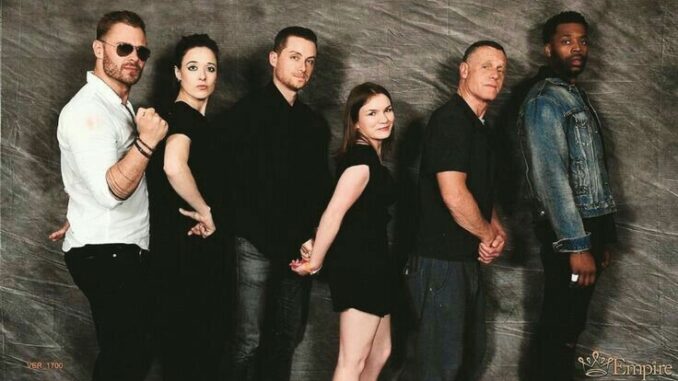
Some episodes of television stay with you—not just for their shock value, but for how deeply they shake you to the core. For fans of Chicago P.D., one such episode lives in the shadows of memory: the night Kim Burgess was abducted, beaten, left for dead, and changed forever. It wasn’t just a story arc—it was a brutal emotional marathon, a descent into darkness that showed us how far the show was willing to go to portray the trauma that real officers often carry but rarely talk about. It wasn’t just Burgess who almost didn’t make it. It was all of us, watching in horror as the most compassionate heart of the Intelligence Unit was pushed to her limits—and nearly lost for good.
The episode begins with a false sense of calm. Burgess is doing what she always does: following the job, trusting her instincts, protecting the innocent. But that’s the thing about Chicago P.D.—just when things seem steady, the floor disappears. In a routine call that quickly spirals out of control, Burgess finds herself isolated, alone, and trapped by men with no regard for her badge or her life. What follows is an excruciating sequence: the struggle, the screams, the moments when she’s forced into submission. It’s not flashy or over-dramatized. It’s raw. It’s terrifying. It’s disturbingly real.
What sets this episode apart isn’t just the violence—though it’s some of the most intense the series has ever shown. It’s the silence. The moments when Burgess is no longer fighting, but surviving. The moments when we, as viewers, are forced to sit with her in the dark. To feel her fear. To realize that for once, the Intelligence Unit might not get there in time. And the show doesn’t cut away. It doesn’t offer us escape. It makes us live it with her. That’s why it hurt so much.
Marina Squerciati’s performance in this episode is nothing short of devastating. Without a single line of dialogue for long stretches, she communicates everything—pain, panic, desperation, and that unspoken question: “Is this how it ends?” It’s a career-defining moment for the actress and a narrative risk for the show that paid off in full. Because in Burgess, we don’t just see a cop. We see a mother. A survivor. A woman who has fought so hard to stay human in a job that chips away at humanity every day.

When she’s finally found—barely alive, bleeding out, clinging to consciousness—the reaction from her team is enough to break even the most hardened viewer. Ruzek, frantic and undone, becomes the vessel for every fan watching. His scream when he finds her isn’t just grief. It’s guilt. He blames himself. We all do. And the camera lingers, cruelly, on her still form as she’s lifted into the ambulance. No music. Just the sounds of sirens, panic, and heartbreak.
But the trauma doesn’t end when the scene fades. In the episodes that follow, Chicago P.D. makes a deliberate choice—not to brush Burgess’s recovery aside, not to let her “bounce back” like so many other shows would. Instead, we see the long, slow climb out of the abyss. The panic attacks. The insomnia. The questions. “Should I go back?” “Am I still strong?” “What if I can’t protect anyone anymore?” These aren’t just fictional struggles. They’re the exact questions real-life officers ask after experiencing violent trauma. And for many survivors watching, Burgess became a mirror.
There’s also a haunting complexity in how the Intelligence Unit responds. They rally around her, yes—but there’s tension too. Upton feels guilt for not being there. Ruzek wants to protect her but doesn’t know how. Voight, usually stone-faced, shows a rare vulnerability, recognizing that even his leadership couldn’t prevent this. And then there’s Makayla—Burgess’s adopted daughter—waiting at home for a mother who might not ever return the same. It’s not just a story about survival. It’s about what we bring back from the fight, and who still waits for us on the other side.
This episode sparked massive online discussion when it aired. Fans flooded forums and social media, praising the realism, the emotional weight, and the decision to give Burgess such a powerful—if painful—storyline. Some called it the most important episode the show had ever done. Others admitted they had to pause it multiple times just to breathe. And perhaps most significantly, survivors of real-life trauma reached out to thank the show for not romanticizing recovery, but showing the jagged, imperfect process in its full form.
In a series known for action, fast pacing, and moral ambiguity, this episode stood still—and in doing so, it screamed. It reminded us why we care so deeply about these characters. Why Burgess, with her quiet strength and fierce compassion, means so much to the team—and to us. She almost didn’t make it. But she did. And that makes her survival one of Chicago P.D.’s most powerful victories.
It wasn’t just another case. It wasn’t just another plot twist. It was a turning point. For Kim. For the Intelligence Unit. For all of us who watch, week after week, and pray that our favorite characters make it home. This time, she did. But she left something behind in that warehouse—and maybe, so did we.
